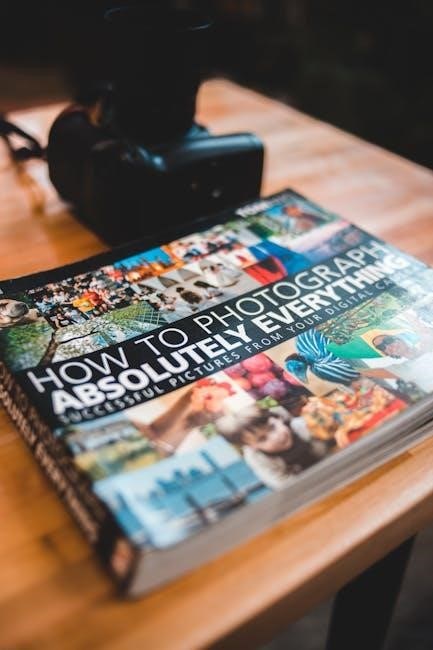Macbeth Act 2 Study Guide Overview
Explore the tragic events of Act 2, where Macbeth’s ambition leads to Duncan’s murder, Lady Macbeth’s manipulation intensifies, and guilt begins to unravel their sanity.
Act 2 unfolds with Banquo and Fleance discussing the witches’ prophecy, while Macbeth, driven by ambition, envisions a dagger and commits the tragic murder of King Duncan. Lady Macbeth, though initially confident, begins to show signs of guilt and mental unraveling. The aftermath of the murder reveals Macduff’s suspicion and the comic relief provided by the porter. Macbeth’s coronation as king marks the rise of tyranny, while Banquo’s growing unease and Fleance’s presence set the stage for future conflicts. The act explores themes of guilt, ambition, and the psychological consequences of sin.
Key Themes in Act 2
Act 2 delves into themes of ambition, as Macbeth’s desire for power drives him to commit murder, and guilt, as both Macbeth and Lady Macbeth grapple with the consequences of their actions. The supernatural is also prominent, with Macbeth’s vision of the dagger symbolizing the influence of dark forces. Additionally, the theme of tyranny emerges as Macbeth seizes the throne, while fate vs. free will is explored through the witches’ prophecies and the characters’ choices. These themes intertwine to create a dark, psychological exploration of human nature and morality.
Major Motifs in Act 2
Act 2 features prominent motifs such as darkness and light, symbolizing moral corruption and truth. The dagger motif represents Macbeth’s psychological turmoil and the consequences of his actions. Blood is a recurring symbol, signifying guilt, violence, and the irreversible nature of sin. The porter’s comic relief contrasts with the tragedy, highlighting the absurdity of the situation. These motifs collectively create a tense and ominous atmosphere, reflecting the characters’ internal struggles and the unfolding tragedy.

Scene 1: Banquo and Fleance
Banquo and Fleance discuss the witches’ prophecy, expressing suspicion and unease. Fleance’s presence highlights Banquo’s fears, setting an eerie tone for the events unfolding.
Banquo’s Suspicion of Macbeth
Banquo’s suspicion of Macbeth grows as he reflects on the witches’ prophecy. He begins to believe Macbeth may seize the throne, fueled by ambition and dark omens. Banquo’s unease escalates when Macbeth, seemingly nervous, avoids direct eye contact. Their midnight conversation reveals Banquo’s internal conflict, torn between loyalty to Duncan and the tempting promise of his own legacy. This tension foreshadows the tragic events that will unfold, highlighting Banquo’s intuitive yet unspoken fears about Macbeth’s intentions. His suspicion lays the groundwork for future conflict and betrayal.
The Prophecy and Banquo’s Ambition
The witches’ prophecy ignites Banquo’s hidden ambition, stirring his desire for royal lineage. Though he outwardly appears loyal to Duncan, Banquo secretly longs for the throne, envisioning his descendants as future kings. This internal struggle between loyalty and ambition is heightened by Macbeth’s erratic behavior, which Banquo interprets as a sign of guilt. The prophecy becomes a double-edged sword, fueling both hope and paranoia, as Banquo grapples with the moral implications of his desires. His ambition, though restrained, sets the stage for future turmoil and conflict with Macbeth.

Fleance’s Role in the Scene
Fleance, Banquo’s son, serves as a silent witness to his father’s internal turmoil. His presence underscores the hereditary aspect of the witches’ prophecy, as Banquo’s ambitions are tied to Fleance’s future. Fleance’s youth and innocence contrast with the dark, conspiratorial atmosphere, highlighting the moral stakes. Though he speaks little, his presence emphasizes Banquo’s paternal hopes and fears, foreshadowing the eventual escape that will preserve his lineage. Fleance’s role is pivotal, as he embodies the potential fulfillment of the prophecy, linking past, present, and future tensions in the play.

Scene 2: The Murder of Duncan
Macbeth, driven by ambition and spurred by Lady Macbeth, commits the tragic murder of King Duncan. A vision of a ghostly dagger haunts him, symbolizing his guilt and the irrevocable act that seals his fate, plunging Scotland into darkness and marking the beginning of his descent into tyranny.
Macbeth’s Vision of the Dagger
Macbeth encounters a spectral dagger, its blade covered in blood, floating before him. This hallucination, a product of his guilt-ridden conscience and the weight of his impending crime, symbolizes the moral and psychological turmoil he faces. The dagger serves as a haunting reminder of the irreversible act of murder, reflecting his internal struggle between ambition and morality. This vision underscores the themes of guilt and the supernatural, highlighting Macbeth’s deteriorating mental state as he prepares to kill King Duncan.
Lady Macbeth’s Manipulation
Lady Macbeth employs emotional blackmail and cunning rhetoric to push Macbeth toward committing the murder. She questions his masculinity and resolve, urging him to act decisively. Her relentless pressure and strategic words weaken Macbeth’s resolve, driving him to proceed with the assassination. This manipulation reveals her own ambition and desire for power, as well as her ability to exploit Macbeth’s vulnerabilities. Her actions set in motion the tragic events of the play, showcasing her significant influence over Macbeth’s decisions and the consequences of unchecked ambition.
The Psychological Impact on Macbeth
Macbeth’s mental state deteriorates significantly after the murder, as guilt and paranoia consume him. His vision of the dagger symbolizes his tormented conscience, while the aftermath leaves him emotionally drained. The weight of his actions creates a sense of irreversible doom, intensifying his fear and anxiety. This psychological unraveling highlights the devastating consequences of his choices, as he becomes increasingly isolated and reliant on Lady Macbeth, who herself begins to succumb to the moral and emotional repercussions of their shared crime.

Scene 3: Aftermath of the Murder
The scene unfolds with chaos and tension as Lady Macbeth and Macbeth confront the aftermath of Duncan’s murder, revealing their guilt and psychological turmoil, while the porter provides dark comic relief.
Lady Macbeth’s Guilt and Unraveling
Lady Macbeth, once the driving force behind the murder, begins to show signs of guilt and mental instability. Her usual composure fades as the reality of their actions sets in, leading to sleeplessness and paranoia. She becomes haunted by the consequences of her decisions, showcasing her internal struggle and the crumbling of her formidable exterior. This marks the beginning of her downward spiral into madness, highlighting the psychological toll of their crimes.
Macduff’s Questions and Suspicion
Macduff, a loyal nobleman, arrives at Macbeth’s castle and begins to ask probing questions about Duncan’s murder. His suspicion grows as he notices inconsistencies in the explanations provided. Macduff’s inquiries add pressure to the already tense atmosphere, highlighting his sharp intuition and loyalty to the late king. His presence also underscores Macbeth’s growing paranoia, as Macduff’s distrust becomes a precursor to future confrontations. This exchange showcases Macduff’s emerging role as a voice of justice and suspicion in the unfolding tragedy.
The Porter’s Comic Relief
In the aftermath of Duncan’s murder, the Porter provides a moment of dark comedy, delivering a drunken monologue about the effects of alcohol. His slow, stumbling demeanor contrasts sharply with the tension of the preceding events. The Porter’s humorous ramblings about “knocking” and the “porter’s occupation” offer a brief respite from the horror of the murder. This comedic interlude serves to highlight the absurdity of the situation and the moral decay unfolding within the castle, while also underscoring the grim reality of Macbeth’s actions through its stark juxtaposition.

Scene 4: The Morning After
Macbeth is crowned king, Banquo grows uneasy, and tyranny begins as Macbeth’s reign starts with suspicion and fear gripping Scotland.
Macbeth’s Coronation as King
Following Duncan’s murder, Macbeth seizes the throne, marking the beginning of his tyrannical rule. His coronation symbolizes the tragic fulfillment of the witches’ prophecy and his ambition.
Banquo’s Growing Unease
Banquo’s suspicion of Macbeth intensifies as he grapples with the witches’ prophecy, fearing Macbeth’s rise to power. He becomes increasingly uneasy, aware of the darkness surrounding him. Banquo’s awareness of the prophecy’s fulfillment and Macbeth’s newfound kingship fuels his distrust. He also fears for his son Fleance’s safety, recognizing the looming threat. This unease highlights Banquo’s moral integrity and foresight, contrasting sharply with Macbeth’s descent into tyranny. His growing anxiety ultimately foreshadows his tragic fate, adding depth to the unfolding drama.
The Establishment of Tyranny
Macbeth’s rise to power after Duncan’s murder marks the beginning of his tyrannical rule. His paranoia grows, leading to manipulation and violence to maintain control. The kingdom descends into chaos as fear and mistrust dominate. Macbeth’s newfound power corrupts him, showcasing the dangers of unchecked ambition. This shift solidifies his transformation from a noble thane to a ruthless king, highlighting Shakespeare’s exploration of power’s corrupting influence and the moral decay that accompanies tyranny. The establishment of Macbeth’s reign sets the stage for further tragedy and unrest.

Major Themes and Analysis
Act 2 delves into ambition, guilt, and conscience, exploring how Macbeth’s pursuit of power leads to moral decay and psychological turmoil, overshadowing the supernatural prophecy.
Guilt and Conscience
In Act 2, guilt and conscience emerge as powerful forces driving the characters’ actions. Macbeth’s vision of the dagger symbolizes his tormented conscience, while Lady Macbeth’s unraveling reveals her internal guilt. Both struggle with the moral implications of their deeds, showcasing how conscience can haunt even the most ambitious. Their inability to escape the psychological burden of murder highlights the destructive nature of unchecked guilt, ultimately leading to their downfall and reinforcing the play’s exploration of moral accountability and the human psyche’s fragility.
Ambition and Power
Ambition and power dominate Act 2 as Macbeth and Lady Macbeth pursue the throne, driven by their insatiable desire for authority. Macbeth’s hesitation fades as Lady Macbeth goads him into action, while Banquo’s suspicions highlight the prophecy’s influence on their ambitions. The murder of Duncan and Macbeth’s subsequent coronation reveal the destructive consequences of unchecked ambition, as power corrupts and destabilizes their lives. This theme underscores the play’s exploration of how the pursuit of power can lead to moral decay and chaos, ultimately destroying those who seek it most fervently.
Fate vs. Free Will
Act 2 explores the tension between fate and free will, as Macbeth and Lady Macbeth grapple with the witches’ prophecy. While the prophecy suggests a predetermined course of events, Macbeth’s decision to murder Duncan underscores the role of personal agency. Banquo’s suspicions and Fleance’s presence highlight the interplay between destiny and individual choice. Macbeth’s vision of the dagger symbolizes the conflict between his ambition and moral hesitation, illustrating how fate can influence but not entirely control human actions, leaving room for moral responsibility and self-determination.

Character Development in Act 2
Macbeth’s transformation into a tyrannical leader intensifies, driven by guilt and paranoia. Lady Macbeth’s façade crumbles, revealing her inner turmoil. Banquo’s suspicion grows, while Fleance remains loyal.
Macbeth’s Transformation
Macbeth’s transformation in Act 2 is marked by his descent into darkness. Driven by ambition and goaded by Lady Macbeth, he commits regicide, murdering King Duncan. This act irreparably alters his psyche, leading to overwhelming guilt and paranoia. His vision of the dagger symbolizes his torturous conscience. Post-murder, Macbeth’s once-noble character erodes, replaced by ruthlessness and tyranny. His coronation as king further isolates him morally and emotionally, cementing his tragic downfall into madness and tyranny;
Lady Macbeth’s Downfall
Lady Macbeth’s downfall begins as her initial boldness fades, replaced by overwhelming guilt and psychological unraveling. After goading Macbeth into murdering Duncan, she becomes consumed by the consequences of their actions. Her sleepwalking scene reveals her inner turmoil, as she relives the crime and acknowledges her shared responsibility. Unable to bear the weight of her conscience, she ultimately takes her own life, symbolizing the destructive power of unchecked ambition and the moral decay that accompanies it.
Banquo as a Foil to Macbeth
Banquo serves as a moral contrast to Macbeth, highlighting Macbeth’s descent into tyranny. While Macbeth acts on his ambition, Banquo resists the witches’ prophecy, showing honor and restraint. Banquo’s suspicion of Macbeth underscores the moral divide between them, as Banquo remains loyal to Duncan and Scotland. His presence emphasizes Macbeth’s guilt and the consequences of his choices, making Banquo a symbol of integrity in a world corrupted by ambition and murder.

Study Guide Resources and Tips
Utilize SparkNotes, Quizlet, and Course Hero for detailed summaries, analysis, and key quotes. Practice with flashcards and quizzes to master Act 2 concepts effectively.
Key Quotes to Analyze
“Is this a dagger which I see before me, / The handle toward my hand?” ⎻ Macbeth’s hallucination reveals his guilt and psychological turmoil.
“Unsex me here, / And fill me from the crown to the toe top-full / Of direst cruelty!” ⎻ Lady Macbeth’s plea underscores her ruthless ambition.
“What hands are here! Ha, they pluck out mine eyes.
Will all great Neptune’s ocean wash this blood / Clean from my hand?” ⎼ Macbeth’s horror reflects his conscience.
“I could not say ‘Amen’ / When they did say ‘God bless us’.” ⎻ Highlights Macbeth’s moral decay and spiritual isolation.
“Sleep shall neither night nor day / House upon their eyes.” ⎼ Emphasizes the paranoia and unrest following Duncan’s murder.

Practice Questions and Answers
What motivates Macbeth to commit the murder of Duncan?
⎼ Macbeth is driven by his ambition and the prophecy of the witches, spurred on by Lady Macbeth’s goading.
How does Lady Macbeth manipulate Macbeth?
⎻ She challenges his manhood and questions his courage to force him into action.
What does Banquo suspect about Macbeth?
⎻ Banquo suspects Macbeth may have fulfilled the witches’ prophecy by killing Duncan.
Why does Macduff question Macbeth’s actions?
⎼ Macduff is suspicious of Macbeth’s sudden rise to power and his evasive behavior.
What symbolic role does the dagger play?
⎻ It symbolizes Macbeth’s guilt and the supernatural forces driving his actions.
These questions help deepen understanding of Act 2’s key moments and themes.
Recommended Study Tools and Guides
Enhance your understanding of Act 2 with these resources:
– SparkNotes Macbeth Study Guide: Provides detailed summaries, analysis, and key quotes.
– Quizlet Flashcards: Memorize terms and concepts related to Act 2 scenes and themes.
– Macbeth Study Guide by Course Hero: Offers scene-by-scene breakdowns and character insights.
– Cheat Sheet for Act 2: Simplifies complex themes like guilt and ambition.
– Paper Art Analysis: Visual tools to explore symbolic elements like the dagger.
These tools help students grasp the play’s depth and prepare for exams or discussions.
